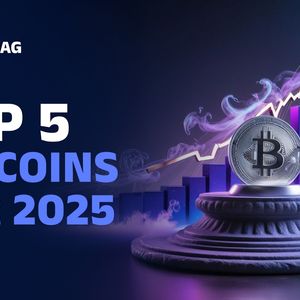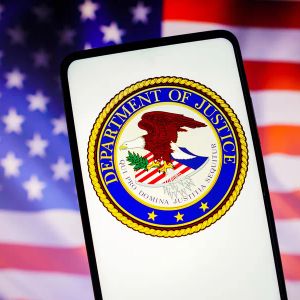Shock: US Crypto Regulation Hearing Collapses Over Donald Trump Crypto Ties
5 min read
A highly anticipated joint congressional hearing aimed at tackling the complexities of US crypto regulation recently ended in dramatic fashion, collapsing before it even truly began. This sudden breakdown wasn’t due to a lack of interest in the topic, but rather a deep political rift centered around concerns over former U.S. President Donald Trump crypto connections and the potential for conflicts of interest among officials involved in the digital asset space. Why the House Crypto Hearing Hit a Wall The planned session was intended to bring together lawmakers from different committees to discuss and potentially forge a path forward for comprehensive US crypto regulation . However, according to reports, House Democrats raised significant objections, fundamentally disagreeing with the scope and focus proposed for the joint meeting. Their primary concern? The growing involvement of prominent political figures, including former President Donald Trump crypto activities, in the digital asset market. This fundamental disagreement proved insurmountable, leading to the unprecedented decision to scrap the joint format. Instead of a unified front, lawmakers retreated to their respective corners: Republicans: Proceeded with a separate roundtable discussion focused primarily on the technical and economic aspects of crypto regulation, aiming to understand the technology and potential frameworks for oversight. Democrats: Convened their own meeting, shifting the focus sharply towards ethics, potential corruption risks associated with politicians holding or promoting digital assets, and discussing the possibility of a politician crypto ban . This split starkly illustrates the deep divisions within Congress regarding how to approach the rapidly evolving world of cryptocurrencies. It’s not just about technology or finance; it’s increasingly becoming entangled with political ethics and potential conflicts of interest. The Donald Trump Crypto Connection: A Point of Contention The specific mention of Donald Trump crypto ties as a reason for the hearing’s collapse highlights a growing concern among some lawmakers. As a former president and potential future candidate, his engagement with digital assets – including owning crypto and promoting related ventures – raises questions about potential influence and whether his financial interests could impact future policy decisions should he return to office or continue to be a public figure influencing policy debates. Democrats argued that ignoring these potential ethical issues and conflicts of interest would render any regulatory discussion incomplete or even compromised. They believe that establishing clear ethical guidelines, or even implementing a politician crypto ban on trading or profiting from digital assets while in office, is a necessary prerequisite for developing fair and effective US crypto regulation . The Intensifying Crypto Policy Debate This incident underscores how the crypto policy debate in the U.S. is multifaceted and often contentious. While there’s broad agreement that some form of regulation is needed, there’s significant disagreement on: Key Areas of Disagreement in the Crypto Policy Debate: Area Republican Focus (Generally) Democrat Focus (Generally) Primary Goal Fostering innovation, market clarity, investor protection through defined rules. Consumer protection, financial stability, preventing illicit use, addressing ethical concerns. Regulatory Approach Potentially creating new frameworks, assigning clear agency roles (CFTC vs. SEC). Utilizing existing regulations where possible, strong enforcement, potentially new ethics rules. Key Concerns Over-regulation stifling growth, lack of clarity, U.S. competitiveness. Fraud, scams, market manipulation, systemic risk, political conflicts of interest. Ethics Angle Less emphasized in general regulatory discussions. High priority, focus on transparency and potential restrictions for officials. The collapse of the joint House crypto hearing is a clear symptom of this broader political deadlock. When lawmakers can’t even agree on the agenda for discussing US crypto regulation , passing comprehensive legislation becomes an even more daunting challenge. Pushing for a Politician Crypto Ban The Democrats’ decision to hold a separate session specifically focused on proposing a politician crypto ban highlights their urgency regarding this ethical dimension. Similar to rules preventing insider trading in traditional markets, proponents argue that officials making decisions about crypto policy should not be in a position to profit from those decisions based on their holdings or privileged information. This proposal aims to remove potential conflicts of interest and build public trust in the regulatory process. Whether such a ban gains traction remains to be seen, but its emergence as a central point of discussion demonstrates the increasing scrutiny on the intersection of personal finance, political power, and the digital asset landscape. The concerns over Donald Trump crypto holdings likely serve as a prominent example fueling this push. What This Means for the Future of US Crypto Regulation The failure of this House crypto hearing is undoubtedly a setback for those hoping for swift and clear US crypto regulation . It signals that political disagreements, particularly those touching upon ethics and high-profile figures like Donald Trump crypto involvement, can easily derail progress. Challenges Ahead: Continued Uncertainty: The lack of a unified approach leaves the crypto industry and investors operating in a fragmented and uncertain regulatory environment. Slow Pace of Legislation: Deep political divisions make passing comprehensive crypto bills through both the House and Senate a difficult, time-consuming process. Focus Shift: The emphasis on ethical concerns, while important, can sometimes overshadow broader discussions about market structure, innovation, and consumer protection frameworks. While separate discussions are still happening, they lack the potential impact of a joint, bipartisan effort. Moving forward, bridging this political divide will be crucial for establishing effective US crypto regulation that fosters innovation while protecting consumers and ensuring market integrity. The entanglement of the crypto policy debate with the personal financial interests of politicians, highlighted by the focus on figures like Donald Trump crypto connections and the call for a politician crypto ban , adds a complex layer to an already challenging legislative task. Conclusion: Political Gridlock Delays Crypto Clarity The dramatic collapse of the planned joint House crypto hearing is a stark reminder of the political hurdles facing the development of clear US crypto regulation . Deep disagreements, fueled in part by concerns over high-profile figures like Donald Trump crypto ties and calls for a politician crypto ban , have split lawmakers into separate camps with differing priorities. This fragmentation slows progress on a critical issue for the digital asset industry and leaves stakeholders waiting for clarity. Until these political divisions can be bridged, the path towards comprehensive crypto policy debate and effective regulation in the United States will remain challenging and uncertain. To learn more about the latest explore our article on key developments shaping the US crypto policy landscape.

Source: Bitcoin World



